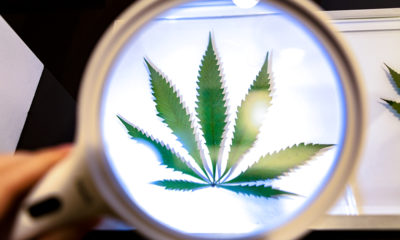
Medical
After 4-Year Wait, Louisiana Medical Patients Can Get Some Weed
Advocates worry “most restrictive” rules in the country may not be sustainable.
Cannabis changed Gary Hess’s life after the 41-year-old United States Marine Corps veteran, who suffers from PTSD, tried medical marijuana in California.
Then the state of Louisiana, where Hess lives and where legal medical cannabis finally went on sale Tuesday, made Hess’s life much simpler — at least in terms of a commute.
Getting here took “only” four years, and what cannabis Hess found for sale at Capitol Wellness Solutions in Baton Rouge, one of Louisiana’s nine medical-marijuana dispensaries on the first day of sales on Tuesday bears little resemblance to what he saw out West, as the Washington Post reported.
Still, this is progress — which indicates how rough cannabis laws have been in this part of the United States, even among the 34 states and growing where medical marijuana is available in some form.
Like much of the American South, Louisiana still has strict criminal penalties for cannabis users. First-time possession is a criminal offense — and if you are caught with a joint four times, you can spend up to eight years in state prison, like one of the notorious plantation-style prisons where inmates perform free labor.
As is the sad norm in the United States, most people caught up in the criminal justice system for smoking weed are black: According to a 2013 study conducted by the American Civil Liberties Union, blacks in the state were 3.1 times more likely to be arrested for marijuana-related offenses than whites, despite near-identical rates of use.
This isn’t very good, though most visitors to the state need not worry: Possession in New Orleans, the place out-of-staters are most likely to find themselves (and in which they might bring cannabis), was decriminalized by the City Council in 2016 and is now punishable by a $40 fine.
Despite all this — or perhaps recognizing the purple streak in state politics that exists even after the mass exodus of people of color from New Orleans following Hurricane Katrina — Louisiana was the first state in the Deep South to legalize medical cannabis for severely sick people, and it did so via the legislative process in 2015, rather than a ballot initiative.
Yet somehow, patients in nearby Arkansas, where voters legalized the drug more than a year later in November 2016, managed to enjoy access months earlier. And of the nine dispensaries allowed to do business in the state of 4.66 million, only seven opened for business on Tuesday. (Should we mention that the list of open dispensaries in Oklahoma, which legalized medical marijuana only last summer, is more than 100 pages long and that there are more dispensaries on the average block in Tulsa than in the entire state of Louisiana?)
What took so long? Testing, partially, but mostly an imperative for control.
Louisiana allows only two licensed growers to produce medical cannabis, both under the auspices of a research university — one Southern University, the other Louisiana State University.
Only one of the two companies working with the universities has begun submitting product to the state Department of Agriculture and Forestry in late July. The other parted ways with its initial partner and put in the first crop only two weeks ago and the state cleared the cannabis for sale on August 1.
Cannabis advocates have long complained that the state made the process needlessly lengthy and complicated — an argument made more convincing with the relative ease other states made cannabis available.
Louisiana is also keeping in step with other southern states which restrict heavily what cannabis is available and how it can be consumed.
To become a patient in the state, one must suffer from a “debilitating medical” condition. According to the WAFB-9, these include “cancer, epilepsy, Parkinson’s disease, intractable pain and/or HIV.”
And once qualified, patients in Louisiana can only access edibles, oils, extracts, and via “metered-dose inhalers.” Cannabis in “smokable form,” the form in which most of us know and recognize cannabis, is not allowed.
The delays irritated state lawmakers as well as cannabis advocates and (of course) the “hundreds” of already-qualified patients forced to sit around and wait for medicine (or continue buying from underground sources).
“The toughest thing has been not being able to give people a definitive timeline that they could make plans for,” said state Sen. Fred Mills, a pharmacist by trade who sponsored the original law, in an interview with ABC News. Mills “never thought” it would take so long, and had to field numerous “difficult calls” from very sick people inquiring with decreasing patience as to when they’d be able to get the medicine they were promised.
In addition to Hess, there were two other patients in line to buy cannabis in Baton Rouge on Tuesday, both of whom suffer from brain cancer. Other dispensaries made sales on Tuesday “by appointment only,” as Marijuana Business Daily reported. Products available included a $90 30-cubic-centimeter bottle of CBD-rich “solution” to $200 for the same product but with CBD.
So! Limited supply, limited availability, and high prices — what advocates believe is “one of the most restrictive programs in the country, if not the most restrictive,” after a four-year wait.
“I don’t feel at this point the program is going to be sustainable as it is today,” said Kevin Caldwell, the founder and president of the advocacy group Common Sense NOLA, in an interview with MJ Biz Daily. But it’s better than nothing!
TELL US, do you have access to medical marijuana?
























